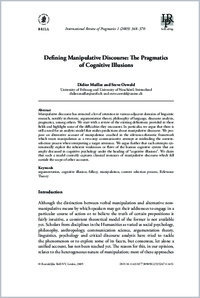Defining manipulative discourse : the pragmatics of cognitive illusions
BLE-BLL
- Maillat, Didier Université de Fribourg
- Oswald, Steve Université de Fribourg
-
2009
Published in:
- International review of pragmatics. - Brill. - 2009, vol. 1, p. 348-370
English
Manipulative discourse has attracted a lot of attention in various adjacent domains of linguistic research, notably in rhetoric, argumentation theory, philosophy of language, discourse analysis, pragmatics, among others. We start with a review of the existing definitions provided in these fields and highlight some of the difficulties they encounter. In particular, we argue that there is still a need for an analytic model that makes predictions about manipulative discourse. We propose an alternative account of manipulation couched in the relevance-theoretic framework which treats manipulation as a two-step communicative attempt at misleading the contextselection process when interpreting a target utterance. We argue further that such attempts systematically exploit the inherent weaknesses or fl aws of the human cognitive system that are amply discussed in cognitive psychology under the heading of “cognitive illusions”. We claim that such a model correctly captures classical instances of manipulative discourse which fall outside the scope of other accounts.
- Faculty
- Faculté des lettres et des sciences humaines
- Department
- Département d'anglais
- Language
-
- English
- Classification
- Language, linguistics
- License
-
License undefined
- Identifiers
-
- RERO DOC 326820
- RERO R005530538
- DOI 10.1163/187730909X12535267111651
- Persistent URL
- https://folia.unifr.ch/unifr/documents/308064
Statistics
Document views: 363
File downloads:
- Texte intégral: 765
